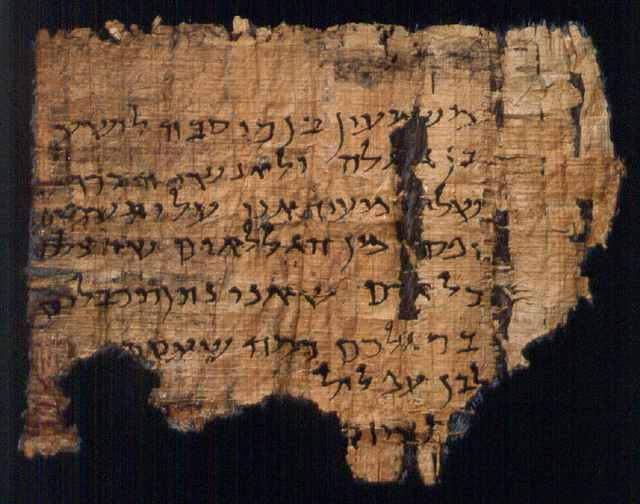Preparing for Sukkot
“Shimon to Yehudah, son of Menasheh, at Qiryat Arabayyah- I have delivered to you two donkeys (in order) that you dispatch along with them two men to Yehonathan, son of Ba’yan, and to Mesabalah (in order) that they pack up and deliver to the camp, to you, palm branches and citrons. And you are to send additional persons from your place and let them bring you myrtle branches and willows. And prepare them, and deliver them to the camp, because the population is large. Fare well!”
“On the first day you shall take the product of hadar trees, branches of palm trees, boughs of leafy trees, and willows of the brook, and you shall rejoice before the Lord your God seven days.” (Leviticus 23-40)
Date- 132-135 CE
Current Location- Israel Museum, Jerusalem, Israel
Language and Script- Aramaic, alphabetic
General Information-
• About sixty years after the First Jewish Revolt, which led to the destruction of the Second Temple by the Romans in 70 CE, a group of Jews led by Shimon bar Kosiba attempted a second revolt. He came to be known as bar Kokhba, or “son of the star,” a play on words based on an interpretation of Numbers 24-17 that emphasized the messianic aspirations that were ascribed to him. As we know from the Dead Sea Scrolls, the Apocrypha and Pseudepigrapha, and the quick expansion of early Christianity, this period of Jewish history was laden with messianism. Even the prominent Rabbi Akiba of the Mishnah believed that bar Kokhba was the Messiah. Inevitably, by 135 CE, the revolt was put down by the Roman army and Roman rule over Judea was reestablished under Emperor Hadrian.
• In this Aramaic letter, bar Kosiba asks a lieutenant to gather ritual supplies for the festival of Sukkot, or Tabernacles, for his encampment. Another letter composed in Greek contains a similar request. The author of that letter, Soumaios, has usually been identified as Shimon bar Kosiba, but this is disputed by some scholars.
Circumstances of Discovery and Acquisition- In March 1960, the Israeli archaeologist Yigal Yadin discovered an archive of fifteen letters written by bar Kosiba in the so-called Cave of Letters. The cave is located on the western shore of the Dead Sea in a wadi, a dry riverbed that floods during the wet season, known as Nahal Hever. The cave had apparently served as a hideout for Jews who had participated in the Bar Kokhba Revolt. Subsequently, Yadin discovered dozens of other texts there.
Yadin wrote about the Bar Kokhba Letter-
We come now to one of the most interesting letters in Aramaic consisting of five long lines (the papyrus is twenty-two by six centimeters). It deals with a request by Bar-Kokhba to supply him with the ‘four kinds’ – the lulav (palm branch), ethrog (citron), hadas (myrtle) and arava (willow) – required for the feast of Succoth (the feast of booths or tabernacles). The pathetic nature of the request lies in the fact that it is made in the midst of the war (or more probably towards its end) and Bar-Kokhba goes into great trouble to get them. It is also a testimony to Bar-Kokhba’s strict religious piety. There are many problems concerning this letter…
This is the only letter of Bar-Kokhba not addressed to Yehonathan and Masabala, but to a person unknown to us named Yehudah son of Menashe, who dwells in Qiryath ‘Aravaya. Bar-Kokhba is sending him two donkeys to take two people to Yehonathan and Masabala who, as we know, were in En-gedi. They are to load the donkeys with palm branches and citrons (for which En-gedi was famous) and send these towards Yehudah. Bar-Kokhba also orders Yehudah to send other men to the surrounding area of Qiryath ‘Aravaya for myrtles and willows – for which the area is presumably known. It is interesting that Bar-Kokhba gives specific orders to Yehudah to ‘set [the citrons] in order’. ‘Setting in order’ is a common expression in Talmudic literature, referring to setting aside the tithe. Bar-Kokhba wants to receive the donkeys’ load of citrons after tithing ‘since the army is big’, i.e. he needs quite a lot! That Bar-Kokhba specifically orders them to be tithed, indicates that he does not trust Yehonathan and Masabala, who must have been considered ‘am ha-‘ares (literally- people of the land; a rabbinic usage to designate unlearned people not to be relied upon to keep to the letter of the law).
The fact that Bar-Kokhba himself had to send the donkeys from his camp to carry the ‘four kinds’ indicates the inadequate transport at the disposal of his subordinates. It also reflects the measure of his uncertainty as to whether his orders would be carried out unless he sent the necessary transport.
Yigael Yadin. Bar-Kokhba- The rediscovery of the legendary hero of the last Jewish Revolt against Imperial Rome. Weidenfeld and Nicolson, Jerusalem 1971. pp. 128-129.
See also-

